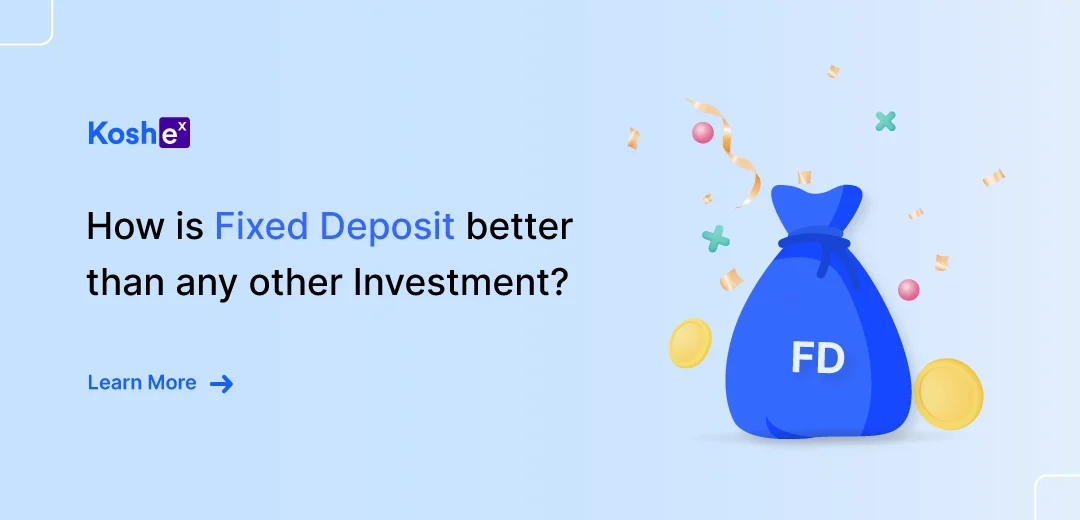Fixed deposits have long been a popular investment choice for individuals looking for stable and secure returns. However, it is affected by various factors and therefore, it is crucial to understand how these economic factors can impact the value of fixed deposits.
One of the most significant factors that affect fixed deposits is inflation. Inflation can have a profound effect on the purchasing power of your investments, including fixed deposits. Let’s explore the impact of high inflation on fixed deposits and discuss strategies to mitigate its effects with Koshex – the one-stop solution for all your investment needs!
What Is Inflation?
Inflation refers to the persistent rise in the general price level of goods and services in an economy over time. It erodes the purchasing power of money, meaning that the same amount of money will buy fewer goods and services in the future as compared to the present.
Inflation in India is measured by various indices. This includes the Consumer Price Index (CPI) or the Wholesale Price Index (WPI). They track the changes in the prices of a basket of goods and services. The Reserve Bank of India declares the inflation rate periodically which is depicted as percentage points.
How Does Inflation Impact Fixed Income-Generating Instruments?
Inflation affects fixed income-generating instruments, including fixed deposits, in several ways. Firstly, inflation erodes the purchasing power of the interest income earned from fixed deposits. When the rate of inflation exceeds the interest rate offered on fixed deposits, the real value of the interest earned diminishes over time. This means that even though the nominal interest rate remains the same, the actual value of the interest income decreases in terms of the goods and services it can buy.
Secondly, inflation affects the value of money over the long term. As prices rise, the value of money decreases. Therefore, the fixed deposit amount that appears substantial today may not be sufficient to meet future expenses due to the eroding effect of inflation.
Impact of Inflation on Returns of Fixed Deposits
High inflation can significantly impact the real returns earned from fixed deposits. Let’s understand this with a simple example. Suppose you invest Rs. 1 lakh in a fixed deposit with an annual interest rate of 6% for three years. At the end of the tenure, let’s say you receive a total maturity amount of Rs. 1,19,102.
However, if the average inflation rate during this period is 4%, the purchasing power of Rs. 1 lakh would decrease. The real return on your investment would be the nominal return of 6% minus the inflation rate of 4%, resulting in a real return of only 2%.
This means that while your fixed deposit appears to have grown at 6% per annum, the real value of your investment has increased by a much smaller margin (i.e., 2%) due to the impact of inflation. This is how inflation affects fixed deposits.
Investment Strategy During an Inflationary Period
To safeguard the value of your investments during an inflationary period, it is important to consider investment strategies that can help counteract the effects of inflation. Here are a few strategies to consider:
- Diversify Your Investment Portfolio: Instead of relying solely on fixed deposits, diversify your portfolio by investing in a mix of asset classes. This can include equities, real estate, and inflation-protected securities. This can help mitigate the impact of high inflation and potentially provide higher returns.
- Invest in Tax-Efficient Instruments: Inflation can push individuals into higher tax brackets. To mitigate the impact of taxes on your investments, consider tax-efficient instruments such as tax-free bonds or tax-saving fixed deposits.
- Opt for Short-term Deposits: During an inflationary period, it may be advisable to opt for short-term fixed deposits. This allows you to reassess your investment strategy more frequently and take advantage of potentially higher interest rates in the future.
- Always Invest in High-Income Generating Instruments: If you want to avoid your money losing its value due to inflation, you need to grow it at a rate higher than the inflation rate. Thus, you need to invest in instruments that provide returns higher than the current inflation rate. Some fixed deposit schemes allow investors to earn better than inflation. The key is to compare various FDs or different investment instruments and find the ones that comfortably beat the inflation rate.
In a Nutshell
Inflation lowers the amount of money you make from your investments and weakens your purchasing power or the ability to buy things. This means that when you want to spend the money you invested, it might not be worth as much as before. Inflation can impact various types of financial instruments in varying ways, including fixed deposits.
To counteract the effects of inflation, it is crucial to diversify your investment portfolio and opt for tax-efficient investment options. By employing these strategies, you can better protect your investments and preserve their value in the face of inflationary pressures.
Koshex allows you to invest in instruments that can earn you returns higher than the inflation rate. It has a wide pool of fixed deposit schemes from which you can select the one that best suits your investment objectives. Once you select your desired scheme, you can directly invest in the fixed deposit scheme through Koshex. By earning returns higher than inflation, you can make sure that your money grows significantly over the long term along with a rise in your purchasing power. So, start investing with Koshex today!
FAQs
Q: Can fixed deposits provide a hedge against inflation?
A: Fixed deposits may not provide a direct hedge against inflation as the interest rates offered on fixed deposits may not always keep pace with rising prices. However, they can still be a part of a diversified investment portfolio that includes other asset classes.
Q: Are there any fixed deposit schemes specifically designed to combat inflation?
A: There are no fixed deposit schemes specifically designed to combat high inflation. However, with the changes in interest rates, banks, and financial institutions also change the rates of fixed deposits. It is advisable to explore such options and compare their features before making investment decisions.









Leave a Comment